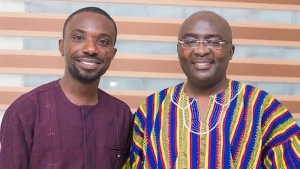Vodafone Cash remains one of the safest means to send and receive mobile money in the country, given the security measures embedded in the system, Head of Vodafone cash, Martinson Obeng-Agyei, has said.
“We have strong security systems in place to prevent fraud; but when they do happen, because a customer might have given out vital information to a mobile money vender, we quickly take steps to correct it.
“The system is so strong that even the people at our call centres do not have access to a complainant’s account when he or she calls to report a fraud. The call centre personnel would have to key-in the data the customer provides to even be able to see their account before going ahead to block any account,” he said.
He was speaking as a panellist at the second edition of the B&FT-organized quarterly Ghana’s Most Respected CEOs Breakfast series. This quarter’s event was under the theme ‘National Agenda for E-Payment and Financial Inclusion: The role of the Stakeholders’.
Mr. Obeng-Agyei added that the boundaries of mobile payment security are being made stronger day after day.
He indicated that mobile money agents are among the most important players in the electronic payment ecosystem, and continuous engagement with them is essential in curbing fraud and promoting mobile money as a payment system.
E-payment has changed the face of payments for goods and services, enabling them to be made for a wide range of products or services through a mobile device, and has witnessed mass acceptance.
Mobile money does not require the user to carry along anything, just their smart device; and thus it has completely revolutionised financial access nationwide, especially for the unbanked.
The ultimate aim of the telcos is to bridge the gap between the banked and the unbanked. “Consumers have built trust with their mobile money service providers as against their banks. In the mind of the customer, the money is with the telco and not the bank. Meanwhile, the money is in the bank. We are not a bank, but a service provider that bridges a gap between the consumer and the bank,” he added.
Business News of Thursday, 27 June 2019
Source: thebftonline.com
Vodafone Cash security measures strong – Obeng-Agyei
Entertainment












